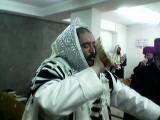A Simple Jew queried:A few months ago I ate at a local kosher Chinese restaurant. At the end of the meal, the waiter brought me a fortune cookie that contained this saying inside,
"Discontent is the first necessity of progress."Reflecting upon the fortune cookie's message, it struck me that this sounded a lot like the Alter Rebbe's teaching in
Chapter 31 of Tanya about the difference between the destructiveness of
atzvus (depression) and the potential benefits of
merirus (bitterness).
Could you please explain what the application of this teaching from Tanya is to us in our generation?
Akiva from Mystical Paths responded:A Simple Jew reveals himself to be anything but. He follows the Baal Shem Tov's aphorism to look for lessons of Torah and see Hashem in everything. Hashaga Pratis (divine orchestration) in a fortune cookie? Absolutely, for those who are looking for it.
The question appears rather straightforward as secular society goes on at length about the dangers of depression, such that a whole division of the medical profession and drugs have been created to 'treat' it. But looking in to the Tanya reveals a completely different depth and perspective on this question.
Chassidus teaches that Torah and mitzvot need to be performed with joy. To quote the Baal HaTanya, quoting from the Talmud Shabbos 30b, 'The Shechina (Divine Presence) abides only in joy...as is the case also in the study of Torah.' Great emphasis is placed on approaching Torah and mitzvot as a privilege and pleasure, not, G-d forbid, a burden.
Yet we are also instructed to spend some time in self reflection. What is our state, what is our lot? How far are we from what we could be? When doing so, it's quite normal to come to a state that's the opposite of joy.
The Tanya teaches us, that's ok if directed correctly. Further, not only is it ok it can be absolutely necessary. For while great levels can be reached with Chesed, the attributes and sefirah of kindness, some heights, or rather, some depths, some drives, can only be counteracted and raised upwards through Gevurah, the attributes and sefirah of strictness / severity.
This is the path of bitterness. By becoming bitter with our situation, how far we have fallen from where we should be, how distant we are from our Father in heaven compared to where we could be, it drives us to strive harder, to push farther, to reach where otherwise we wouldn't. It pushes us to focus on what's important, our connection with the divine, and push away from what's not, the gross needs of the body and the physical pleasures of this world. It doesn't elevate the body or it's natural life force (and the Tanya teaches that only the tzaddikim, the righteous saints, can reach the point of really doing so), but rather brings us to constrain it and provide pure focus on our connection with G-d, our nefesh elokus, which is the best that the benoni (the intermediate man) can achieve.















